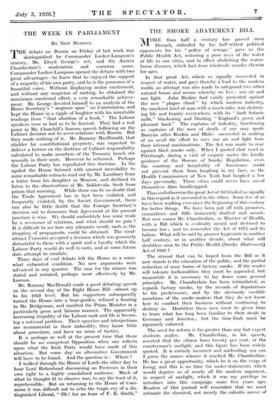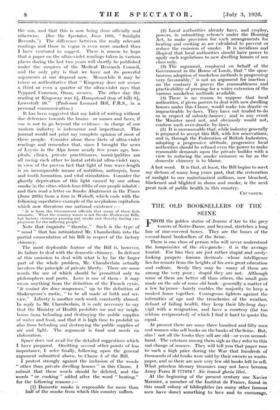THE SMOKE ABATEMENT BILL
MORE than half a century has passed since Disraeli, ridiculed by his half-witted political opponents for his "policy of sewage," gave us the Public Health Act, restoring a pure river of the water of life to our cities, and in effect abolishing the water- borne diseases, which had done wholesale murder therein for ages.
In that great Act, which so signally succeeded in respect of water, and gave thereby a lead to the modern world, an attempt was also made to safeguard two other natural boons and means whereby we live : our air and our light. Jolm Ruskin had vainly protested against the new "plague cloud" by which modern industry, the muckiest kind of man with a muck-rake, was destroy- ing life and beauty everywhere, with its " dark Satanic mills," blackening and blasting "England's green and pleasant land." The captains of industry, functioning as captains of the men of death—if one may quote Bunyan after Ruskin and Blake—succeeded in making of no avail the effort to save our air and light from their infernal machinations. The Act was made to read against black smoke only. When I quoted that word in Pittsburgh, during a visit of enquiry under the kindly guidance of the Bureau of Smoke Regulation, even the courtesy and hospitality of Americans could not prevent them from laughing in my face, as tin! Health Commissioner of New York had laughed a few days previously. Those cities could never have saved themselves thus handicapped.
Thus and otherwise the great Act of 1875 failed as signally in this regard as it succeeded in the other. Some few of us have been working ever since the beginning of this century for better things. We have been put off with promises, committees and Bills insincerely drafted and meant.
But now comes Mr. Chamberlain, as Minister of Health, with a Bill which is evidently meant and destined to become law ; and we remember the Act of 1875 and its failure. What will be said by pioneer hygienists in another half century, or in another decade, about what will doubtless soon be the Public Health (Smoke Abatement) Act of 1926?
The utmost that can be hoped from the Bill as it now stands is the education of the public, and the partial reduction of some forms of factory smoke. If the reader will tolerate technicalities they must be appended, but meanwhile it is necessary to lay down some general principles. Mr. Chamberlain has been intimidated, as regards factory smoke, by the records of deputations to his predecessors, and by the obviously credible assertions of the smoke-makers that they do not know how to conduct their business without continuing to destroy us. Doubtless these men must be given time to learn what has long been familiar to their rivals in Germany and America ; but the time-limit must be rigorously enforced.
The need for reform is far greater than any but expert students realize. Mr. Chamberlain, in his speech, asserted that the citizen loses twenty per cent, of the countryman's sunlight, and this figure has been widely quoted. It is entirely incorrect and misleading, nor can I guess the source whence it reached Mr. Chamberlain. He has a great opportunity, which he is on the verge of losing, and this is no time for under-statements which would deprive us of nearly all the modern argument, in respect of sunlight, which it was my privilege to introduce into this campaign some five years ago. Readers of this journal will remember that we must estimate the chemical, not merely the calorific power of the sun, and that this is now being done. officially and otherwise. (See the Spectator, June 19th, "Sunlight Records.") The difference between the really relevant readings and those in vogue is even more marked than I have ventured to suggest. There is reason to hope that a paper on the ultra-violet readings taken in various places during the last two years will shortly be published under the auspices of the Medical Research Council, and the only pity is that we have not its powerful arguments at our disposal now. Meanwhile it may be taken as authoritative that " Kingsway does not seeure a third or even a quarter of the ultra-violet rays that Pcppard Common, Oxon, secures. The other day the reading at Kingsway was 1, Hampstead (top of hill) 8, Lowestoft 10." (Professor Leonard Hill, F.R.S., in 'a personal communication.) It has been suggested that my habit of writing without due deference towards the brains—or names and faces, if one is not to go beyond the evidence—in charge of our modern industry is indecorous and impertinent. .This journal would not print my complete opinion of most of these people. Consider alone these fads of ultra-violet readings and remember that, since I brought the news of Leysin in the Alps home nearly five years ago, hos- pitals, clinics, private practitioners, municipalities are all racing each other to instal artificial ultra-violet rays, in view of the proven fact that light of true wave-length is an incomparable means of nutrition, antisepsis, bone and tooth formation, and vital stimulation. Consider the ghastly deprivation of this light caused by our urban smoke in the cities which four-fifths of our people inhabit : and then read a letter on Smoke Abatement in the Times (June 26th) from a firm in Walsall, which ends with the following superlative example of the acephalous capitalism which now threatens our national existence :— " It is from the Government officials that many of these fads emanate. What the country wants is not Smoke Abatement Bills, but factory chimneys pouring out smoke and thereby finding em- ployment for the suffering people."
Note that exquisite ." thereby." Such is the type of " mind " that has intimidated Mr. Chamberlain into the partial emasculation of his Bill in respect of the factory chimney.
The most deplorable feature of the Bill is, however, its failure to deal with the domestic chimney. In defence of this omission tci deal with what is by far the larger part of the whole problem, Mr. Chamberlain actually involves the principle of private liberty. There are some words the use of which should be permitted Only to philosophers and poets. Love is one of them : it may mean anything from the definition of the French cynic, "le contact des deux muqueuses," up to the definition of Shakespeare's rustic, "to be all made of faith and ser- vice." Liberty is another such word, constantly abused. In reply to Mr. Chamberlain, it is only necessary to say that the Ministry of Health prohibits me and my neigh- bours from befouling and destroying the public supplies of water and food, and that it is high time to prohibit us also from befouling and destroying the public supplies of air and light. The argument is final and needs no elaboration. - Space does not avail for the detailed suggestions which I have prepared. Omitting several other points of less importance, I refer finally, following upon the .general argument submitted above, to Clause 5 of the Bill.
I protest strongly against the inclusion of the words "other than private dwelling houses" in this Clause. I submit that these words should be deleted, and the words "or cooking" added after the word "heating," for 'the following reasons :- (1) Domestic smoke is responsible for more than . halt of the smoke from which this 'country suffers. (2) Local authorities already have, and employ, powers, in submitting scheints under the -Housing Act, to make provision for such arrangements for heating and cooking as are calculated to prevent or reduce the emission of smoke. It is invidious and illogical that local authorities should have power to apply such regulations to new dwelling houses of one class only. (3) The argument, employed on behalf of the Government in the House of Lords; that "the spon- taneous adoption of smokeless methods is progressing very favourably," is not an argument for inaction ; on the contrary it proves the reasonableness and practicability of pressing for a wider extension of the various smokeless methods available. • (4) There is no reason to suppose that local authorities, if given powers to deal with new dwelling houses under this Clause, would make too drastic or impracticable by-laws. They have not tended to do so in respect of subsidy-houses.; and in any event the Minister _need not, and obviously would not, confirm such over-drastic by-laws. (5) It is unreasonable that, while industry generally is prepared to accept this Bill, With feW.reservatiOns, and is, through the Federation of British Industries, adopting a progressive attitude, progressive local authorities should be refused even the power to make reasonable demands upon the private builder with a view to reducing the smoke nuisance so far as the domestic chimney is to blame.
A last word. It is that, at lea st, the Bill begins to meet my dictum of many long years past, that the restoration of sunlight to our malurbanized millions, now bleached, blackened and blighted in slums and smoke, is the next great task of public health in this country.
CRUSADER.











































 Previous page
Previous page